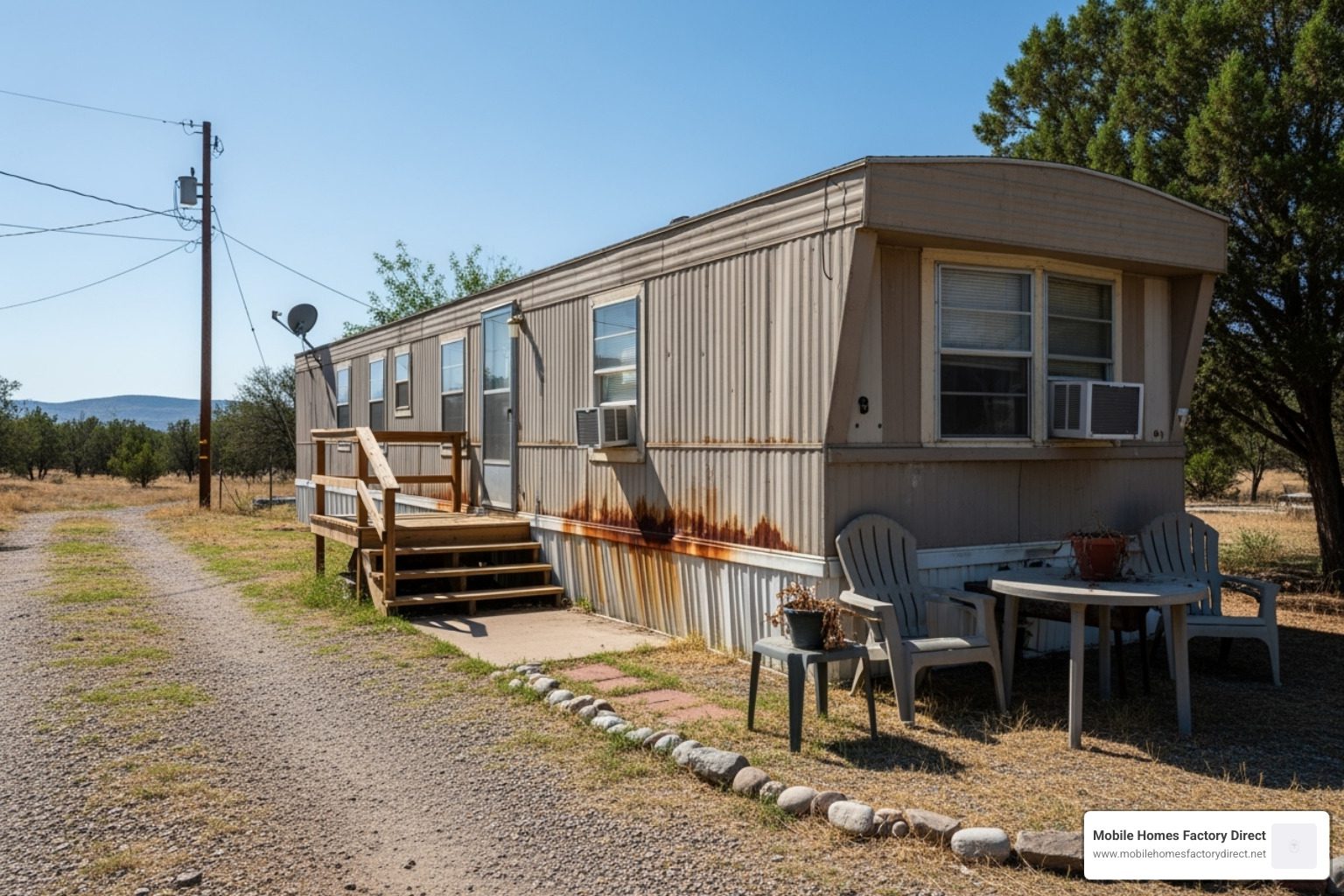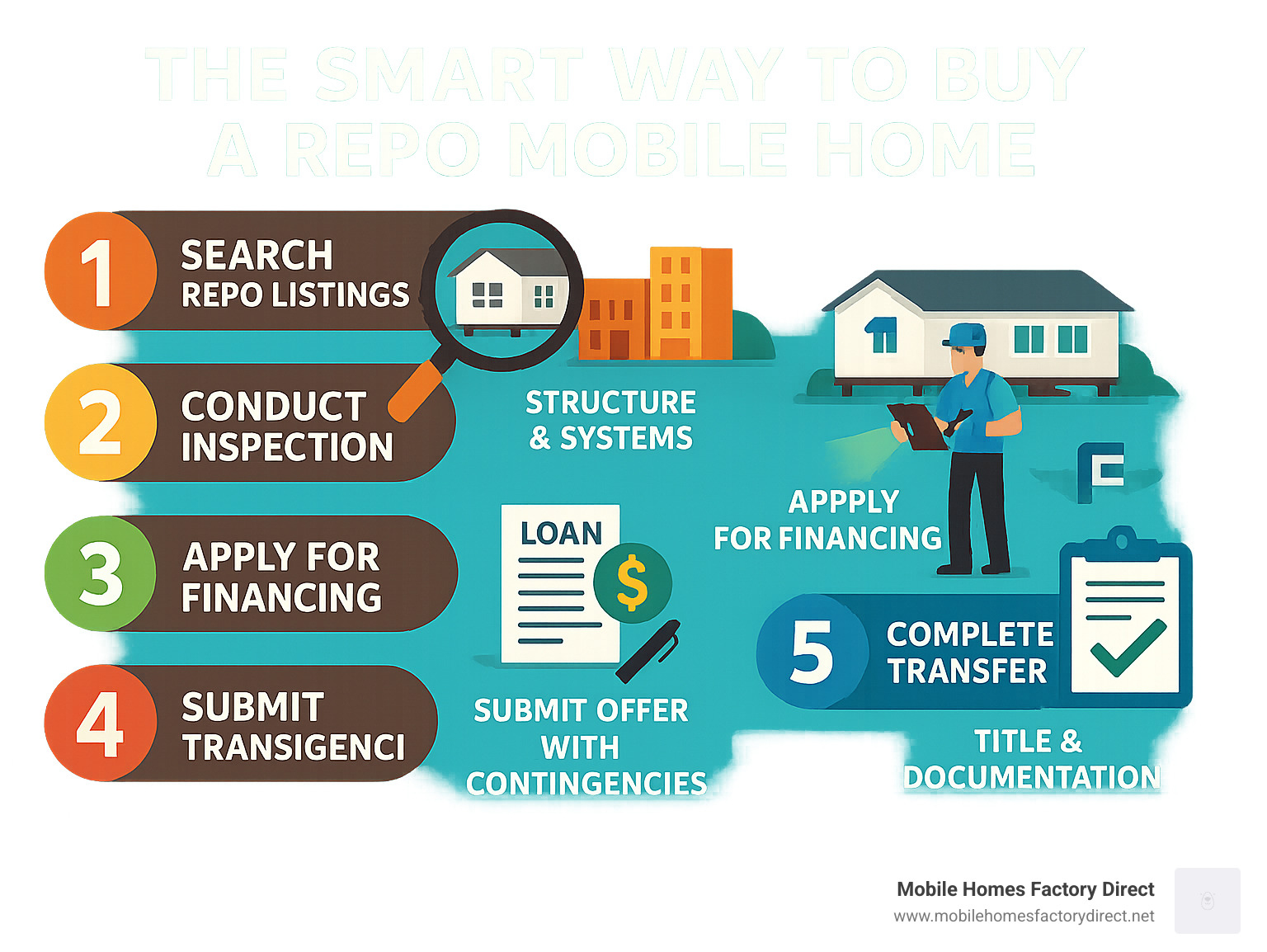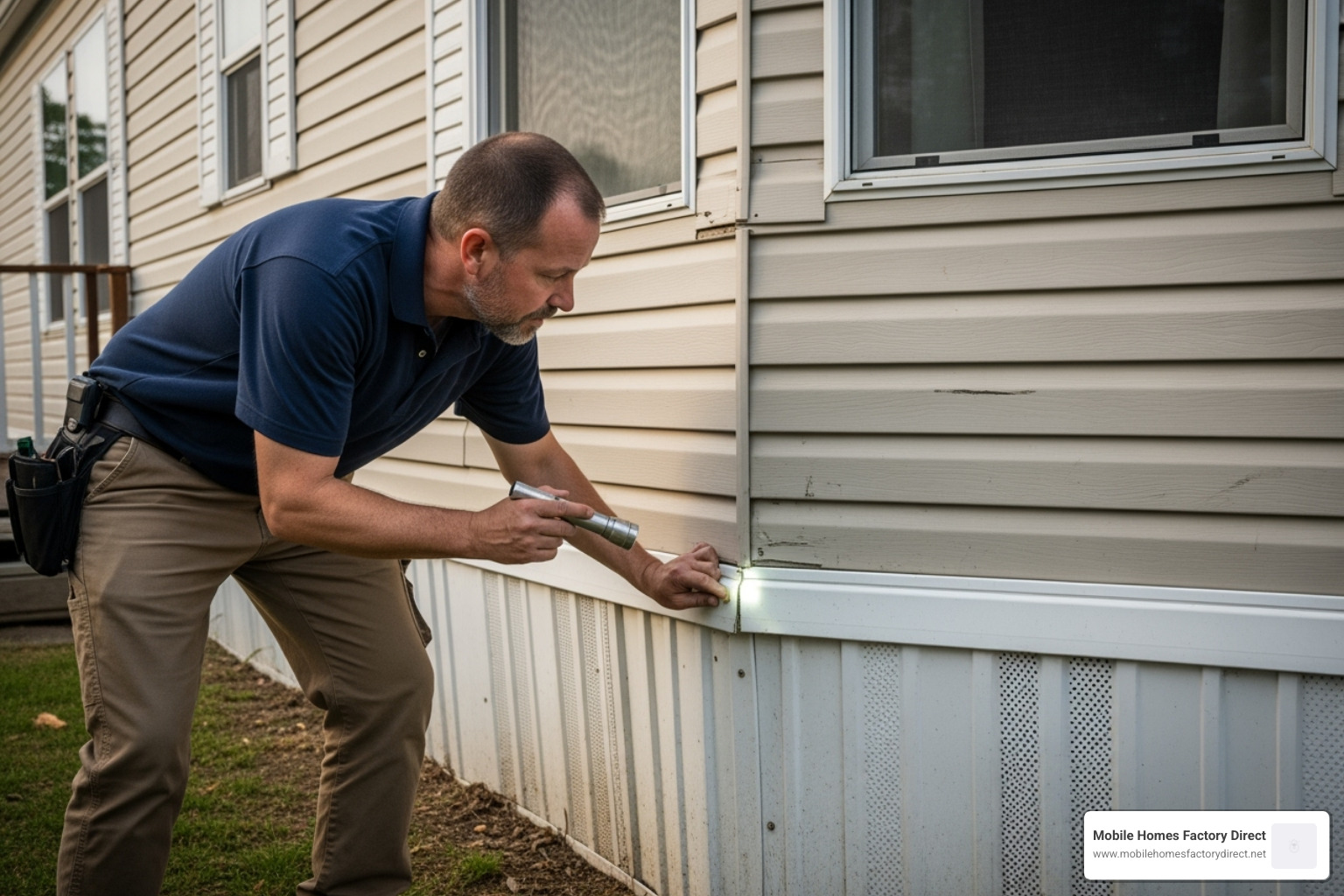The Smart Way to Buy a Repossessed Mobile Home
Learn the smart way to save big by buying a repo mobile home. Get expert tips on finding, inspecting, and financing your affordable dream home.
Why Buying a Repo Mobile Home Could Be Your Key to Affordable Homeownership
Buying a repo mobile home can save you 20% or more compared to traditional housing, making homeownership possible even with a tight budget or credit challenges.
Quick Answer: The 5 Essential Steps
- Find repo listings through bank websites, specialized dealers, and foreclosure auctions
- Inspect thoroughly – hire a professional to check structure, systems, and HUD certification
- Secure financing through chattel loans, FHA Title I, or specialized mobile home lenders
- Make your offer – understand sealed bid vs. traditional negotiation processes
- Complete documentation – ensure clear title, lien releases, and proper permits
A repo mobile home is a manufactured home repossessed by a lender after the original owner defaulted on payments. Banks sell these homes at reduced prices to recover their losses quickly.
Why are they so affordable? Banks aren’t in the housing business. They want these properties off their books fast, creating opportunities for smart buyers. You might find a quality home for $10,000 to $50,000—sometimes for the cost of a down payment on a traditional house.
The catch is that these homes are sold “as-is,” meaning you handle all repairs. That’s why a thorough inspection and pre-arranged financing are crucial.
While the process can seem complex, thousands of families have successfully steerd it to achieve homeownership.
Weighing the Opportunity: The Pros and Cons of Repo Homes
Buying a repo mobile home has its ups and downs. Sometimes you find a gem that just needs a good cleaning, and other times you get a project that needs some love.
The biggest draw is the savings. You can find homes for 20% or more below market value, often between $10,000 and $50,000. That’s a fraction of the cost of a traditional home.
For the handy folks out there, the money you save upfront becomes your renovation budget. You can customize everything to your liking—new flooring, fresh paint, updated fixtures. It’s a blank canvas.
| Pros of Buying a Repo Mobile Home | Cons of Buying a Repo Mobile Home |
|---|---|
| Significant Cost Savings: Repo mobile homes can be discounted up to 20% or more, often selling for $10,000 to $50,000, significantly below market value. This makes them an affordable entry into homeownership. | “As-Is” Condition: Many repo homes are sold without warranties or guarantees. This means any existing damage, neglect, or wear and tear becomes your responsibility. |
| Investment Potential: For those with renovation skills or a budget for repairs, a repo home can be an excellent investment, allowing for value appreciation through improvements. They can be flipped for profit or used for rental income. | Hidden Damage & Unexpected Repair Costs: Without a prior owner to disclose issues, you might uncover costly problems after purchase, such as foundation issues (about 30% of manufactured homes might need foundation work), or extensive water damage (which can exceed $15,000 to repair). |
| Customization Opportunity: The money saved on the purchase price can be reinvested into customizing the home to your exact tastes and needs. Simple improvements like fresh paint, new flooring, or updating fixtures can make a big difference. | Intense Competition: Due to their affordability, repo mobile homes often attract significant interest from other buyers and investors, leading to quick sales and less room for negotiation. The market moves fast, so you need to be ready to act. |
| Move-in Readiness (Sometimes): While many need work, some newer repo homes are only a few years old and can be in desirable condition, requiring little to no immediate repair work. | Limited Financing Options: Traditional lenders and government-backed loans (like FHA, VA) might be hesitant to finance repo homes, especially older ones or those needing significant repairs. This can necessitate specialized lenders or cash purchases. |
| Affordable Housing Solution: For first-time homebuyers or those on a tight budget, these homes offer a path to homeownership that might otherwise be out of reach in a challenging housing market. | Potential Legal & Documentation Issues: Ensuring a clear title, resolving old liens, or navigating complex paperwork from the repossession process can be daunting and may require legal assistance. |
Now for the downside. “As-is” means as-is. No warranties, no take-backs. You’re buying it with all its existing problems.
You might not find all those problems until after the sale. Foundation issues affect about 30% of manufactured homes, and water damage repairs can exceed $15,000. A thorough inspection isn’t just recommended—it’s essential.
You also won’t be the only one interested. These affordable homes attract buyers, investors, and flippers, so you need to be ready to move quickly.
Traditional banks can be hesitant to finance repo mobile homes, especially older ones. You might need to explore specialized lenders or consider a cash purchase.
Despite these challenges, buying a repo mobile home is a viable path to homeownership. The key is to do your homework. For a deeper look, see our guide on the pros and cons of buying repossessed mobile homes.
If you’re willing to do the research, handle potential repairs, and act fast, a repo mobile home could be your ticket to building equity.
Your Step-by-Step Guide to Buying a Repo Mobile Home
Buying a repo mobile home requires smart choices and thorough homework. Think of it as a treasure hunt where you need the right map to find the gold safely.
How to Find Repo Mobile Homes for Sale
The first step is knowing where to look, as repo homes don’t always appear in regular listings.
Bank websites are a great starting point. Look for “foreclosure” or “REO properties” (Real Estate Owned). Banks are motivated sellers, which can lead to better negotiations.
Specialized dealers like us at Mobile Homes Factory Direct often have the best selection and guidance. We regularly work with repos and can guide you through the process. Our team serves families across Texas, including Von Ormy, San Antonio, Laredo, New Braunfels, Corpus Christi, and Victoria. We also assist in communities like Somerset, Atascosa, Poteet, and Devine. Start your search here: Find Repo Mobile Homes For Sale Near Me.
Online marketplaces like MHVillage, Craigslist, and Facebook Marketplace can be goldmines. Government agencies also hold auctions. Be ready to act fast, as good deals disappear quickly.
Local real estate agents specializing in foreclosures may know about listings before they’re public.
Sometimes, the old-fashioned approach works best: drive through manufactured home communities and look for “for sale” signs.
The Pre-Purchase Inspection: What to Look For
This step is critical. Since repo homes are sold “as-is,” you inherit all existing problems. A professional inspection is worth every penny. Hire an inspector who specializes in manufactured homes.
Structural issues are the biggest concern. Check the foundation and blocking for cracks or shifts. About 30% of manufactured homes need foundation work. Examine the frame and chassis for rust or damage.
Inspect walls, floors, and ceilings in every room. Soft spots in floors often indicate water damage, while warped walls or sagging ceilings are also red flags. Check the roof carefully for leaks.
Water damage is especially tricky. Look around windows, doors, and under sinks for signs of water damage. Repairs can exceed $15,000.
Test every electrical outlet and check the breaker box for overheating or amateur repairs. Faulty wiring causes about 13% of house fires.
Run all faucets, toilets, and showers to check water pressure and drainage. Look for pipe corrosion. Ensure the heating and cooling systems work, as replacement is expensive.
A crucial step many miss: find the HUD certification label and data plate. The red HUD label (outside) and data plate (inside, near the electrical panel) confirm the home meets federal standards and provide vital info. Missing labels are a huge red flag.
Making an Offer and Closing the Deal
Once you’ve inspected a promising home, it’s time to make an offer. The process varies by seller.
Sealed bids are common for bank-owned properties. You submit your best offer by a deadline without knowing other bids.
Traditional offers are more common with dealers, allowing negotiation based on your inspection findings. Use any finded problems to justify a lower price.
Lenders want to recover their money, not profit, which often means more flexibility in negotiations. Present inspection findings professionally to explain how repair costs affect your offer.
The closing process for a repo home has unique challenges. Work with legal professionals who understand manufactured home transactions to ensure correct paperwork and avoid costly mistakes.
Getting a clear title is critical, proving no outstanding claims exist against the home. Verify the VIN on the title matches the home’s VIN.
For more details, see our guide on Repossessed Mobile Homes. We’re here to make your path to homeownership as smooth as possible.
Securing Financing and Finalizing the Paperwork
Even with the amazing discounts on repo homes, most buyers need financing. Buying a repo mobile home involves a unique financing process that differs from traditional home loans.
Regular banks often hesitate to finance repo mobile homes due to their “as-is” condition, age, or classification as personal property. However, plenty of other solutions are available.
Navigating Financing When Buying a Repo Mobile Home
Chattel loans are common for mobile homes. They treat the home as personal property, securing the loan with the home itself. Terms are often shorter (15-20 years) with slightly higher interest rates (6.5% to 12%), but they are easier to qualify for than traditional mortgages.
A personal loan might work for smaller, more affordable repo homes, but they typically have higher interest rates (8% to 15%) and shorter repayment periods.
Specialized lenders understand the mobile home market. At Mobile Homes Factory Direct, we have a network of these lenders and offer Financing For Mobile Homes with flexible options for all credit types.
FHA Title I loans are government-backed loans for manufactured homes. They can offer better terms, even for credit scores around 580, but the home must meet safety requirements and be on a permanent foundation or in an approved park.
Cash purchases provide significant negotiating power, especially at “as-is” auctions, and simplify the closing process.
If you have poor credit, don’t give up. While traditional banks may be hesitant, specialized mobile home lenders are often more understanding. We have solutions for those with bad or no credit; learn more about How To Get A Mobile Home With Bad Credit.
Some lenders require credit scores of 600+, but others work with scores as low as 550. Be prepared with a down payment (5-20% for chattel loans) and a debt-to-income ratio below 43%.
Essential Documentation for Buying a Repo Mobile Home
Proper paperwork is the foundation of protecting your investment.
A clear title is the most important document. It proves ownership and guarantees there are no outstanding liens or claims. We double-check that the VIN (Vehicle Identification Number) on the title matches the one on the home.
VIN verification is like the home’s fingerprint. This unique identifier is usually on a metal plate on the frame or near the data plate inside.
Lien release forms protect you from the previous owner’s debt. You need proof that any prior lender’s lien has been fully released.
Don’t forget permits and zoning compliance. If you plan to move the home, ensure it’s legally allowed on your land and follows local zoning rules, including installation permits.
For our Texas customers, familiarize yourself with Texas-specific regulations. The Texas Department of Housing and Community Affairs (TDHCA) oversees manufactured housing, from titles to installations. The Texas Department of Housing and Community Affairs website has detailed information. You’ll also need TxDOT permits for transport.
Finally, the bill of sale is the official document transferring ownership from the seller to you.
Frequently Asked Questions about Repo Mobile Homes
We get a lot of questions about buying a repo mobile home, which makes sense since it’s not the traditional path to homeownership. Here are the straight answers to the questions we hear most often.
How much can I save when buying a repo mobile home?
The potential savings are impressive. You can typically save 20% or more compared to market value, with many homes available in the $10,000 to $50,000 range.
Your actual savings depend on several key factors. The condition of the home plays the biggest role. A home needing extensive repairs will cost less upfront, but you must factor in those repair costs.
Size and age are also considerations. A single-wide will cost less than a double-wide, and newer repo homes may command higher prices but still offer significant savings over buying new.
Don’t forget about location. A repo home in a high-demand area like San Antonio might sell for more than one in a less populated area.
To dive deeper into pricing factors, our Mobile Home Pricing Guide breaks down manufactured home values.
What are the biggest red flags to watch for during an inspection?
When inspecting a repo mobile home, certain red flags require careful consideration.
Major structural issues are the biggest concern: soft floors, sagging ceilings, warped walls, or cracks in the foundation or frame. These are serious underlying problems, not just cosmetic fixes.
Water damage and mold are equally serious. Look for musty odors, water stains, or visible mold. Water damage repairs can exceed $15,000 and pose health risks.
Electrical problems are a safety hazard. Flickering lights, tripped breakers, or exposed wiring are all warning signs. Faulty electrical systems cause about 13% of household fires.
A missing or damaged HUD data plate and certification label can cause problems with financing, insurance, or moving permits.
Significant pest infestations often indicate structural damage and require professional extermination.
When in doubt, invest in a professional inspector. The small upfront cost can save you from massive headaches later.
Can I buy a repo mobile home if it needs to be moved?
Absolutely. Many repo mobile homes are sold as “home only,” meaning you buy the structure and move it to your land or a mobile home park. This often offers even better savings.
Moving a mobile home requires a specialized company. Transport fees typically range from $3,000 to $10,000, depending on distance and home size.
Installation costs can range from $7,000 to $47,000 for a complete setup, including leveling, anchoring, utility hookups, skirting, and steps. Utility connections alone can run $1,000 to $9,000.
Your land needs site preparation, including clearing, grading, and a proper foundation or pad.
Moving permits are required. In Texas, you’ll need permits from TxDOT and possibly local counties.
Older homes can be more fragile and susceptible to damage during transport, which is why working with an experienced, licensed, and insured mover is crucial.
Before committing, ensure your land is zoned for manufactured homes and has utility access. If you’re looking to relocate a home in Texas, we can help. Check our Used Mobile Homes for Sale in San Antonio, TX for examples.
Moving a home is manageable with the right team and planning, and it’s often worth the effort for the savings.
Conclusion: Your Path to Affordable Homeownership
Buying a repo mobile home is more than a bargain hunt; it’s a way to open the door to homeownership. These homes offer significant savings of 20% or more, putting quality housing within reach for families on tight budgets or with credit challenges.
The benefits are clear: cost savings, investment potential, and customization opportunities. However, the risks are real: “as-is” condition means you inherit any problems, and hidden damage can be costly.
This is why due diligence is critical. A professional inspection is essential and can save you thousands later.
While financing can seem tricky, options like chattel loans, FHA Title I programs, and specialized lenders provide a path forward.
At Mobile Homes Factory Direct, we help families achieve homeownership, regardless of credit or budget. We know repo homes can be a smart investment for a prepared buyer.
Our team serves families throughout Texas, including Von Ormy, San Antonio, Laredo, New Braunfels, Corpus Christi, and Victoria. We provide expert guidance, flexible financing, and the information you need to make confident decisions.
With proper research, inspection, and support, a repo mobile home can be your stepping stone to homeownership.
Ready to explore your options? We’re your trusted partner for this journey.





